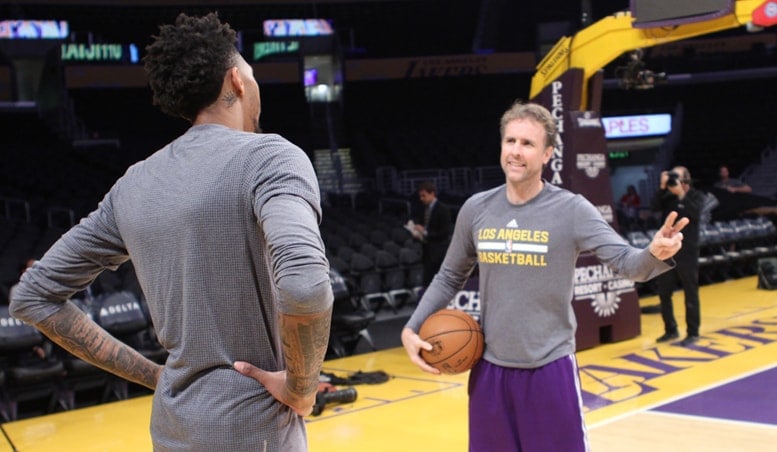When Kareem Abdul-Jabbar cemented his legacy as the greatest scorer in NBA history, he didn’t do it at the Forum or any of the other 22 NBA arenas at the time.
Instead — on April 5, 1984 at Las Vegas’ Thomas & Mack Center — the Lakers legend let go of a baseline skyhook that found the bottom of the net, surpassing Wilt Chamberlain’s 31,419 career points.
At the time, the Utah Jazz were struggling to fill seats in Salt Lake City, so they played 11 home games in Vegas for that season. A packed house of 18,389 — the Jazz’s largest since moving from New Orleans in 1979 — buzzed all game long, as Abdul-Jabbar needed 22 points to pass Chamberlain.
The Las Vegas faithful roared when he finally reached his total in the fourth quarter, and, recognizing the occasion, the game was stopped as Commissioner David Stern went to center court to recognize Kareem and allow him to give a speech mid-contest.
The Lakers went on to win, 129-115, beginning a strong connection with Las Vegas.

The purple and gold began playing preseason games there in 1988, but the next time they arrived for a contest that counted was under overwhelmingly different circumstances.
Fearing for the safety of fans and players during the Los Angeles riots, Lakers management moved Game 4 of the Western Conference opening round from Inglewood to Las Vegas on May 3, 1992.
A season that began with Magic Johnson’s stunning and sudden retirement due to his contraction of HIV reached its conclusion amid another bleak, bigger-than-basketball backdrop, as the Lakers were eliminated by Portland in Vegas, 102-76.
Five years later, the Lakers began playing at least one preseason tilt in Las Vegas every non-lockout year.
The 2017 edition of the annual exhibition was a chance for the Lakers to help the city in its own moment of tragedy, as all proceeds of the game directly benefited the victims, families and first responders affected by the shooting in Las Vegas just one week prior.
Outside of preseason, another type of exhibition was held in Vegas in 2007, when it was selected to host the NBA All-Star Game.
In the same building where Abdul-Jabbar broke the scoring record 23 years earlier, another Los Angeles superstar put on a show.
Kobe Bryant treated the crowd to a Vegas-worthy performance, leading the Western Conference to victory by piling up 31 points, five rebounds, six assists and six steals. For his efforts, he was named All-Star Game MVP for the second of four times in his career.
The night before, Bryant also finished as runner-up in the Skills Challenge, as the Lakers were well-represented that weekend. Andrew Bynum and Jordan Farmar played in the Rookie Challenge, while Smush Parker, retired Laker Michael Cooper and the Los Angeles Sparks' Temeka Johnson competed for L.A. at the Shooting Stars Competition.

But perhaps no event shows how much Vegas loves the Lakers as the annual NBA Summer League. The Lakers began playing in the tournament in 2007 and always draw much bigger crowds than all the other teams.
In fact, Thomas & Mack Center consistently found itself packed when second-overall pick Lonzo Ball led the Lakers to the 2017 Summer League title..
Ball broke the event’s assist record by dishing out 9.3 per game, while also collecting two triple-doubles after Summer League had gone a decade without a single one.
Though Lonzo earned summer MVP honors, he missed the championship game due to an ankle sprain. Fortunately for the Lakers, fellow rookie Kyle Kuzma stepped up with 30 points and 10 rebounds to lead his team to the title.

As for the roster, the Lakers have never had a player born or raised in Las Vegas. However, there have been two who played in college at the University of Nevada, Las Vegas.
John Trapp was a backup small forward on the 1971-72 Lakers, who won an NBA-record 33 straight games. Trapp averaged 5.7 points and 3.1 rebounds, becoming the first UNLV product to win an NBA championship.

Twenty-nine years later, Isaiah “J.R.” Rider joined the Lakers on the heels of their 2000 title.
Rider had averaged 19.3 points for Atlanta the year before, but was one of Bryant’s backups with the Lakers, pitching in 7.6 points in 18.0 minutes for the team that won the second of three straight championships.
Rider — who only played one season for Los Angeles — was the fifth-overall pick by Minnesota back in 1993 thanks to his dominant career at UNLV.
After playing at two community colleges, he landed in Vegas in 1991 just in time to lead the team with 20.7 points per game, as the Runnin’ Rebels demolished their competition, finishing the year as the nation’s seventh-ranked team after going 26-2 overall and 18-0 in the Big West.
Though UNLV wouldn’t repeat its team success the following season, Rider was even better. He put up 29.1 points a night — the second-most in the country — and was named a Second Team All-American and Big West Player of the Year.

Vegas also has a representative on the team’s current coaching staff.
Assistant coach Brian Keefe played his final two college seasons at UNLV after transferring from UC Irvine in 1997. A slick-shooting guard, Keefe averaged 16.4 points as a sophomore with the Anteaters but took on a smaller role for the Rebels, contributing 7.0 points per game in his time there.

